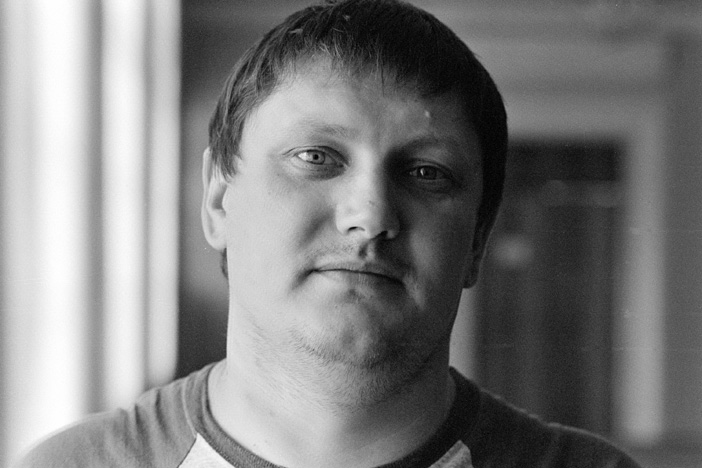
Roman, former miner and now volunteer coordinator in a summer camp
»Until 2014 I worked in the mining industry and at the same time I was a volunteer in a camp for children who had been affected by the war. In 2014, I noticed that the mining and the work in the camp were too much for me and I stopped my job in the mining industry.<< >>
In order to work with children who have experienced severe war trauma, I consult specialists' because I don't have any education in this respect. Since 2015, we have been working very intensely with children who live directly at the front line.
This work began exactly on June 3, 2015, when there were attacks from the occupied territories on the cities of Mar'yanka and Krasnogorowka. Since then we were directly affected by the shootings and realized that it was necessary to evacuate the children from those troubled regions. We organized this evacuation without help and opened a camp in Sviatohirsk, where we take care of a group of children.
The first children from the gray zone* or directly from the front line, with whom we had to deal, were very reserved. One could observe aggression among the them, some could not express their feelings and were very introverted. During the first few days we just waited for them to smile again. We tried to lighten up their feelings by means of games. The children's parents sometimes don't understand how severly their children are affected by the war.
Some parents think that the children are able to recognize and estimate the danger and to protect themselves and that the they became accustomed to the shooting. But I think that such parents misjudge the situation, because for me it's not normal for children to know where the bullets come from that could hit them. Actually these parents also need psychological support to assess the situation correctly. Some of them fall into depression or try to solve the problems with drinking alcohol. And because the parents don't understand their own war trauma, they pass it on to their children.
I think that the children are going to carry on these unresolved war trauma so that the war will have a very long echo in their lives. So they have to cope with their own problems and above that with the problems plus the problems of their parents that they need to process. The most important thing for me is that the children build healthy and normal relationships in the camp, like friendly relationships, where they support one another and can also profit from those relations.
First, we are trying to rebuild security for the kids in the camp and have to take into consideration that this is not possible in all places or in nature. We also take care not to make loud noises, for example the bursting of balloons. Once I experienced a child to sit down on the floor and start screaming hysterically as a balloon burst.
I think that the contact with media and television can have a very negative impact on the children as they accept the things they see there as true and don't question them as much as they do while reading books.
Also useful information is spread by the media, but there is nobody who teaches children how to deal with the media, concerning what is important and what is not. It would be most useful if the parents could teach their children how to deal with it. But there are not many who are really able to handle the use of media in a good way and there is the ironic question in Soviet: Are you smarter than TV?
All this information on television and the media causes a big mash in the people's minds and everyone is looking for something that suits him best. Therfore I'm skeptical if the children are given an objective picture of reality by looking at the screen. Against this background, we have tried to build a media centre in Mar'yanka in 2016. There, children are supposed to pass on the information they had perceived in person.
The children received tuition from journalists and learned, how to deal with information and how to prepare and present these information for others. But unfortunately and contrary to our hopes those children were more interested in film and video animations than in written and printed material.
In a new camp we again try to introduce the children to media use. This second attempt was very well-received by them. Those, who took part in the classes and returned to their villages later, are now sending us their perceptions and observations from everyday life. We plan to publish these children's observations in a newspaper and also want to publish them online on YouTube. In total, we have ten cities or places from which we receive information from their point of view, but we are still at the beginning of this project.
We are also working with people in the occupied territories. There are people who see the reality and others who form their opinion only through television. But also on our own side these experiences can be made, as there are people, who are expecting to be liberated from the other side and it is sad to realize that.«
* Gray zone: the area next to the front-line where exists a high risk of shootings or military conflict